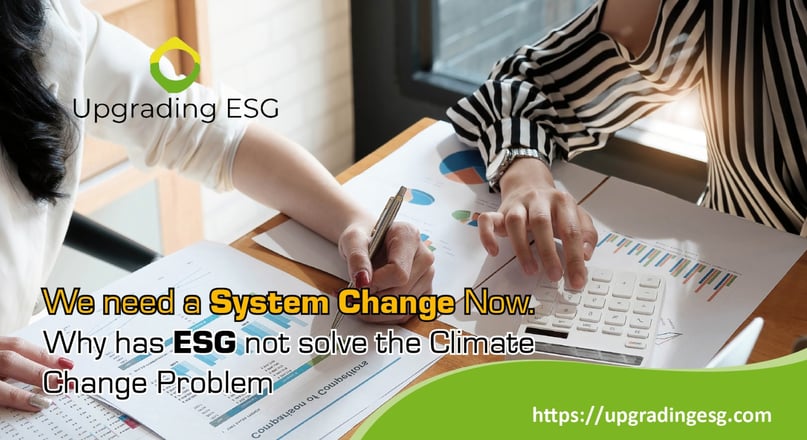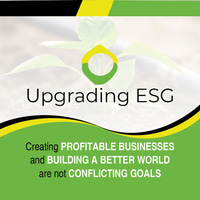We need a System Change Now
We need a System Change Now


We look at how the rapidly growing problems strongly indicate that modern human systems are breaking down. Substantial systemic changes are needed to avoid system collapse. And ask - Why has ESG not solved the climate change problem? And we ask what we can as a Business do about this.
Why has ESG not solved the climate change problem?
Well, my LinkedIn was full of reasons for this. Can I share some of these?
Mike Barry posted
“Not me Guv.... it's always someone's problem, someone else who needs to take the lead.
Crucially Jim Skea, new Chair of IPCC, notes that what's lacking are detailed action plans and the political will to actually deliver the easily made #NetZero promises.
And the same charge could be laid at the doorstep of the corporate world, replete with press releases but typically translated by only 1% of companies into real, sustained decarbonisation.
“World leaders have been warned by the United Nations’ chief climate change scientist to “stick to” the shift from petrol and diesel to electric cars, and that opening new oil reserves was storing up “very difficult choices” for future governments.”
Walter R. Stahel added:
“The planet and humankind do not need more research and IPCC and COP meetings where 60'000 experts congregate, many by private jets! We have known it all, measuring the continued, even accelerating decline of conditions and quality of life, will not solve the problem.”
Simon Ferrigno suggested:
“Each country - especially big polluters - needs to have a permanent standing climate change expert committee with the authority to scrutinise all govt and business actions on climate change, with the power to intervene and block as necessary. We're at that level of emergency. “
So, how do we go about creating systems change?
Systems change investing is an investment approach that seeks to drive positive and sustainable impact by addressing root causes and transforming the underlying structures, policies, and practices within societal, economic, or organisational systems.
In this blog, sharing ideas from Frank Dixon, an advocate of system change, and introduce the concept Impact-Weighted Accounts, which highlights the actual damage caused to the Environment by many of the world’s leading companies. It makes terrifying reading.
Quoting Frank Dixon, “Despite becoming mainstream, ESG has not resolved climate change and other SDG problems (about $40 trillion). Instead, many environmental, social, economic and political problems are rapidly worsening. Clearly, new forms of responsible investing and corporate sustainability are needed.
The main reason current ESG strategies don't resolve major challenges and thereby fail to protect business and society is that they largely are focused on changing companies instead of addressing symptoms, such as climate change.
But companies do what economic and political systems demand. Reductionistic systems unintentionally compel companies to cause climate change and other problems. These systems are the root causes of significant challenges. Improving them is at least 80% of the SDG and sustainability solution.
Rapidly growing problems strongly indicate that modern human systems are breaking down. Substantial systemic changes are needed to avoid system collapse.
System Change Investing (SCI) shifts the focus of responsible investing to system change and root causes. It is the most powerful strategy available to humanity for driving rapid systemic change. SCI is relatively easy to implement. It enables asset managers to enhance returns, reputation and AUM.
The approach incentivises the financial and corporate sectors to engage in system change. It transforms vested interests from being major system change barriers to strong drivers of it.
Under current systems, companies often maximise profits by degrading the environment and society. A primary system flaw is the failure to hold companies fully responsible for negative impacts. This general mechanism makes it impossible in competitive markets to stop harm and remain in business. Sustainable systems hold companies fully responsible. Under these systems, companies maximize profits by not harming society.”
https://globalsystemchange.com/system-change-investing-is-the-next-evolution-of-esg/
It is worth mentioning Impact-Weighted Accounts (IWA). This is a methodology developed by Harvard Business School to measure a company's financial performance while also considering its environmental, social, and governance (ESG) impact, allowing investors and stakeholders to gain a comprehensive understanding of its true societal contribution and risks. The approach quantifies positive and negative impacts, providing a more holistic view of a company's value creation and alignment with sustainable practices. This is an approach being advocated Sir. Ronald Cohen.
A good example of this application of this accounting method would highlight:
1. Coca-Cola did $ 3bn worth of environmental damage in 2019, and the negative health impact of Danone’s products was nearly $8bn, revealing a new accounting approach. It’s time for self-serving, inaccurate ESG reporting to make way for proper evaluation of companies’ social and environmental impacts, says Sir Ronald Cohen.
2. Out of the almost 2,500 unique companies whose environmental impacts have been monetised between 2010 and 2019, just under 850 created more damage than profit in a year under a 0% discounting scenario. Almost 1,400 created damage equivalent to a quarter or more of their profits
3. Under our current financial framework, airlines can create more pollution than they generate profit. Manufacturers of sugar-laden junk food products can quietly contribute enormously to the incidence of diabetes and other lifestyle diseases, placing enormous burdens on health services and costing taxpayers hundreds of millions of dollars annually.
Sir Ronald Cohen sees impact investing as the next step for ESG. Whereas ESG is often measured through self-serving, inaccurate reporting, impact investment relies on measuring impacts rigorously.
He argues, “Why impact weighted accounting needs to be adopted now?
If the above sounds like a massive and complicated undertaking, that’s because it is. But it’s not as big a step as the introduction of GAAP accounting in the 1930s. Current accounting practices have remained unchanged for decades while our environment and societies have undergone huge changes. Although we see companies publish self-scrutinised ESG statements, investors require much more granular information. Impact accounts must also be audited to the same rigorous standards as financial disclosures.
In conclusion, while accounting and reporting standards and requirements are evolving, ultimately, we need systems change. So, it is time to upgrade ESG. Time to upgrade your business.
Call of action
The aim of Upgrading ESG – Sharing ideas and innovation to upgrade ESG – for a more sustainable world
https://upgradingesg.com
This requires a comprehensive approach integrating sustainable practices, policy changes, technological innovation, and collective action. We can restore and protect the world by working together across sectors and acting at various levels.
I have chosen to keep the words ESG – This represents the best chance we have for Environment and Society. Without Governance – Structure, processes, reporting and transparency, we will continue to greenwash and be hoodwinked. ESG is much more than Investing ESG or Company ESG, but we need to have Country ESG, City ESG and Product ESG where we, the consumer and citizen, know the good and bad of that product for the environment and society.
Hence, the need to Upgrade ESG.
ESG represents a substantial shift in how companies and boards operate their businesses and impact the world for the better. This is cemented by the IFRS’s new sustainability standards, which require a much more comprehensive, documented approach that will drive the need for ESG compliance and assurance. Ultimately, it will affect Investors and positively or negatively on the company's ability to keep or gain new customers.
Companies and boards must take urgent action in this new ESG world.
Upgrading ESG provides an opportunity for your company to upgrade your ESG story.
Our Services:
1. ESG support for CFOs and Directors
2. Provision of Non-Executive ESG Director service
3. ESG compliance and assurance
I invite you to learn how we can help you in your sustainability journey.
Please feel free to reach out to me by email: Jeffrey@upgradingESG.com.
Or browse my blogs on
https://www.upgradingESG.com
Join 20,000 + people on the LinkedIn Upgrading ESG group sharing ideas and news https://www.linkedin.com/groups/133378
Subscribe to my substack channel.
Upgrading ESG Substack
With thanks and blessings
Jeffrey Levine
